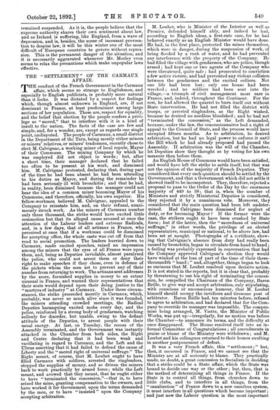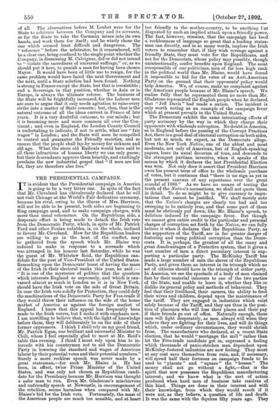THE " SETTLEMENT " OF THE CARMAUX AFFAIR. T HE conduct
of the French Government in the Carmaux affair, which seems so strange to Englishmen, and especially to English publicists, is probably more natural than it looks. It was dictated by a, respect for feelings which, though almost unknown in England, are, if not dominant in France, at least predominant among large sections of her population. These are, respect for equality, and the belief that election by the people confers a privi- lege so "sacred," that to interfere with it is a kind of insult to the nation. The facts of the case are few and simple, and, for a wonder, are, except as regards one single point, undisputed. The people of Carmaux, a small district in the Department of the Tarn, being mostly either miners or miners' relatives, or miners' tradesmen, recently chose to elect M. Calvignac, a working miner of local repute, Mayor of their Commune. The mining Company by which he was employed did not object in words ; but, after a short time, their manager declared that he failed too often to be present at his work, and dismissed him. M. Calvignac protested, declaring that, during part of the time he had been absent he had been attending to his duties as Mayor, and during the remainder he had been seriously ill with bronchitis ; and that he had, in reality, been dismissed because the manager could not bear the idea of a common miner becoming Mayor of his Commune, and therefore, officially, his own superior. His fellow-workmen believed M. Calvignac, appealed to the Company to reinstate him, and, on their refusal, unani- mously struck work. As the miners of Carmaux number only three thousand, the strike would have excited little commotion but that its alleged cause aroused at once the attention of the Labour leaders and extreme Radicals, and, in a few days, that of all artisans in France, who perceived at once that if a workman could be dismissed for accepting office, the whole caste was cut off from that road to social promotion. The leaders hurried down to Carmaux, made excited speeches, raised an impression among the miners that the eyes of all France were upon them, and, being as Deputies inviolable, almost paralysed the police, who could not arrest them or deny their right to make speeches if they chose, even in defence of the pickets whom the men set to prevent any of their number from returning to work. The artisans sent addresses by the score, furnished supplies in money to an extent unusual in France, and warned their representatives that their seats would depend upon their doing justice to the "martyrs of industry" at Carmaux. Under these circum- stances, the strike proceeded merrily in Carmaux, which, probably, was never so much alive since it was founded, the miners attending crowded meetings, the Radical Deputies haranguing excited mobs every day, and the police, reinforced by a strong body of gendarmes, watching sullenly for disorder, but unable, owing to the defiant attitude of the Deputies, to arrest people with their usual energy. At last, on Tuesday, the recess of the Assembly terminated, and the Government was instantly attacked in the Chamber from both sides, the Right and Centre declaring that it had been weak and vacillating in regard to Carmaux, and the Left and the Ultras asserting that it had failed to defend the cause of Liberty and the "sacred right of universal suffrage." The Right meant, of course, that M. Loubet ought to have filled Carmaux with soldiers, arrested the ringleaders, stopped the supplies of money, and so driven the miners back to work practically by armed force ; while the Left meant, and avowed that they meant, that he ought either to have " terminated the concession,"—that is, to have seized the mine, granting compensation to the owners, and have worked it for Government upon the terms demanded by the men, or to have " insisted " upon the Company accepting arbitration. M. Loubet, who is Minister of the Interior as well as Premier, defended himself ably, and indeed he had, according to English ideas, a first-rate case, for he had behaved exactly as an English Minister would have done. He had, in the first place, protected the mines themselves, which were in danger, during the suspension of work, of being flooded by a rush of water, and he had prevented any interference with the property of the Company. He had filled the village with gendarmes, who are police, though armed ; had kept one or two agents of the Company who were threatened, quite safe ; had prosecuted to conviction a few active rioters; and had prevented any violent collision between the gendarmes and the excited colliers. Not one life had been lost ; only one house had been wrecked ; and no soldiers had been sent into the village,—a triumph of civil management most rare in France, and, indeed, throughout the Continent. For the rest, be had allowed the quarrel to burn itself out without State intervention. He had not filled the district with troops, or arrested ringleaders, as the Right wished, because he desired no needless bloodshed ; and he had not "terminated the concession," as the Left demanded, because, under the law, the concessionnaires had a right of appeal to the Council of State, and the process would have occupied fifteen months. As to arbitration, he desired arbitration, but he had no legal power to enforce it until the Bill which he had already proposed had passed the Assembly. If arbitration was the will of the Chamber, let Deputies show they thought so by voting for his own measure then before them.
An English House of Commons would have been satisfied, and would have left the strike to settle itself, but that was not the opinion of the majority of French Deputies. They considered that every such question should be settled by the Government, and that a Government which did not settle it showed itself to be incompetent. They, therefore, rejected a proposal to pass to the Order of the Day by the enormous majority of 449 to 38; that is, when the number of Ministers and strictly Ministerial Deputies is considered, they rejected it by a unanimous vote. Moreover, they considered that the main question had been left undeter- mined. Had Calvignac been dismissed for neglect of duty, or for becoming Mayor ? If the former were the case, the strikers ought to have been crushed by State force ; but if the latter, then the "sacredness of universal suffrage," in other words, the privilege of an elected representative, municipal or national, to be above law, had been set at naught. Photographs of a certificate, show- ing that Calvignac's absence from duty had really been caused by bronchitis, began to circulate from hand to hand ; a feeling was probably expressed in conversation that had the Company approved Calvignac's election they would have winked at the loss of part of the time of their three- thousandth " hand ; " and, altogether, things began to look so ominous that M. Loubet resolved upon decisive action. It is not stated in the reports, but it is clear that, probably by threatening to use his right of terminating the conces- sion, he compelled the Chairman of the Company, Baron Reille, to give way and accept arbitration, only stipulating, with conscious or unconscious humour, that M. Loubet himself should occupy the invidious and tiresome post of arbitrator. Baron Reille had, ten minutes before, refused to agree to arbitration, and had declared that for the Com- pany to override its manager was impossible. The compro- mise being arranged, M. Viette, the Minister of Public Works, was put up—irregularly, for no motion was before the Chamber—to announce its terms, and the difficulty at once disappeared. The House resolved itself into an in- formal Committee of Congratulations ; all amendments in praise or blame of the Ministry were withdrawn ; and M. Loubet and his colleagues returned to their homes exulting in another postponement of defeat.
It was a very French affair, this " settlement ; " but, then, it occurred in France, and we cannot see that the Ministry are at all seriously to blame. They practically made, no doubt, a great concession to Socialism in deciding that a strike could be a State affair, which the State was bound to decide one way or the other ; but, then, that is the method of determining all things in France. If the State is to control all things, from churches down to little clubs, and to interfere in all things, from the " canalisation " of France down to a new omnibus system, it must interfere in all questions which become important ; and just now the Labour question is the most important of all. The alternatives before M. Loubet were for the State to arbitrate between the Company and its servants, or for the State to take the Carmaux mines into its own hands, and work them for itself ; and he wisely chose the one which seemed least difficult and dangerous. The " reference " before the arbitrator, be it remembered, will be a clear one, being confined to the single point whether the Company, in dismissing M. Calvignac, did or did not intend to "violate the sacredness of universal suffrage," or, as we should put it here, to punish a man for having been chosen Mayor. It would have been of little use to resign, for the same problem would have faced the next Government and the next, until a State solution had been found. Nothing is strong in France except the State, but that is irresistible ; and a Sovereign in that position, whether in Asia or in Europe, is always the ultimate referee. The business of the State will be frightfully increased, for the Labour men are sure to argue that it only needs agitation to raise every strike into a matter of State concern ; but, then, that is the natural outcome of all the ideas current in France of late years. It is a very doubtful outcome, to our minds ; but it is becoming more and more common all over the Con- tinent; and even in England, the London County Council is undertaking to indicate, if not to settle, what are "fair wages" in London ; and the State will soon be compelled to control and guarantee the Friendly societies, and so ensure that the people shall lay-by money for sickness and old age. What the stern old Radicals would have said to all these infractions of human liberty we can only guess ; but their descendants approve them heartily, and exultingly proclaim the new industrial gospel that "if men are but fat, they are therefore also free."







































 Previous page
Previous page